#both of them have the same role functionally
Text

..
extra:
(it was a spring morning)
(he was a frail boy with no friends)
(he ran into you from across the wall)
(you said hello to him, and asked him to play along)

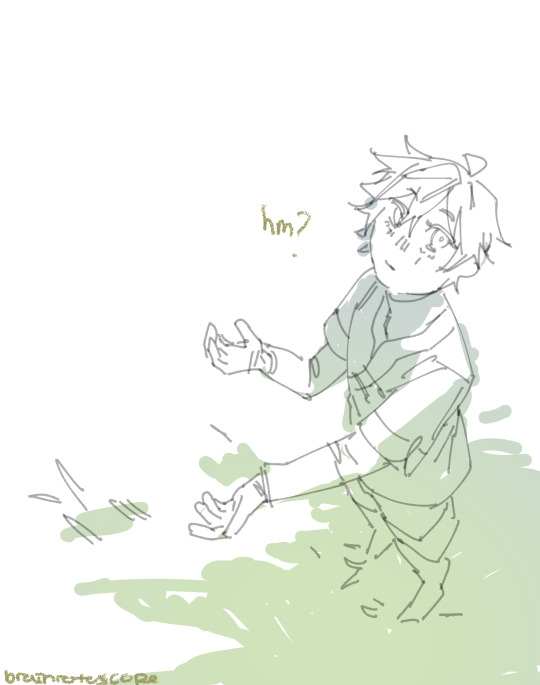
(at that very moment, he received his lifelong—)
extra 2: oscar boogaloo
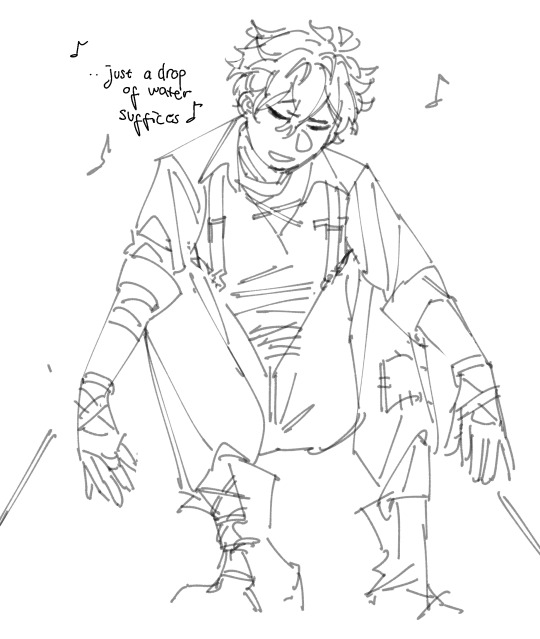
yeahhhh....iykyk
#ozpin#professor ozpin#it never gets less embarassing tagging this#rwby#ugh#wait hm#ozma#salem#not tagging ozlem because its kinda giving ottokallen and ergh#oscar pine#sighs anyways#both of them have the same role functionally#they parallel eachother via#hold on im getting ahead of myself#he really does remins me of otto#theyre like prometheus#but with the gift of flight instead of fire#(haha flight as a heavy-handed metaphor for civilization)#they both give said gift through something of the previous civilization#im playing fast and loose w otto but he gave the gift of flight through ingenuity#thus wooden planes#ozpin gave the gift of flight (quite literally) through his magic#thus#gestures vaguely#i have so much more to say but alas ...#horrible corvid anatomy cw#while ozma is kinda su coded tbh...immortal brown dudes dealing with their megalomaniac white-haired situationship core#if you know what im referencing im so so sorry#EVERY NIGHT BRINGS A DREAM BUT THE DAYYYY RELENTLESSLY KEEPS ME AWAKEEEE#honestly idk where the quote is from kevin said it so it must be true
111 notes
·
View notes
Text
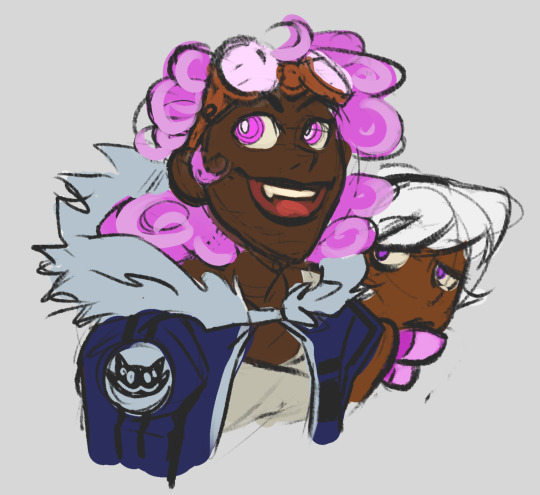
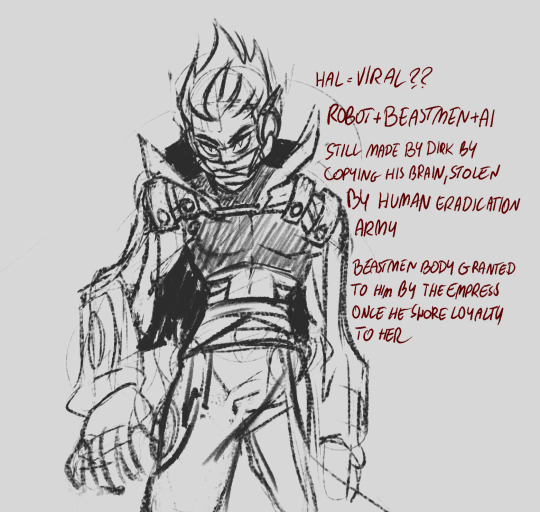
found more ttglstuck stuff in my files
#homestuck#ttglstuck#homestuck au#roxy lalonde#rose lalonde#lil hal#hal strider#god remember ttglstuck... it was fun to think about#i still remember ive had some tidbits thought out about hal and his role but id have to look through my notes#but basically he was stolen when dirk was around 13 and he was granted a body from the empress once he swore loyalty to her#and joined the human eradication army#the body was basically dead already and they had to replace majority of it with robotic parts for it to even function#but through the magic of bioengineering robotics and plot armor it somehow worked#he meets dirk and dave years later basically the same way viral met kamina#with the added flavour that both of them KNOW each other#as for roxy and rose im still on the fence as of where would they join the team#i think itd be either theyre from jakes village#or theyre travelling the surface with some gang and they meet up accidentally
72 notes
·
View notes
Text
Me: I'm fine about my autism now btw, like I've come to terms with my fixated interests, limited tolerances and social inabilities. The alienation it brings is not ideal but it's just a reality I've gotta deal with now that I know it's just a part of who I am. I mean, it's not like an awkward conversation is gonna ruin anyone's life, is it? We'll both move on from it eventually. This is fine!
Also me: physically unable to watch beyond the first word of the first question of The Assembly because oh my god what if someone says something awkward or controversial or someone can't make themselves understood people are gonna get mad and scream about it online and I will freeze up and be stuck in the backlash forever I don't know how to handle conflict AT ALL let's just hide in the corner behind the sofa instead wait what if I became a hermit actually yeah yeah yeah that sounds good let's do that
#unresolved trauma? never even heard of her haha 😅#maddie debrief#that 2-minute intro/taster did nothing to calm me down either btw#I'm never comfortable around the types of shows where 'difference' becomes the core conceit of the premise#oh. so you've created a format dependent on making a socially alienated group face the social rules that made them alien in the first place#and then deriving your conflict from the 'natural contradiction' between the two?#sounds like the exact kind of conflict-seeking environment where I can let my normal guard down enough to meaningfully challenge#my deeply rooted feeling that people generally find me cumbersome to be around and mostly just tolerate my presence out of necessity#lovely that#(like i say I haven't seen the show#so idk if it is actually like that or if it's just the promo material stirring shit up as per usual#but as of rn I do not feel welcome in this room)#why does the 'we're not so different after all' always have to come at the climax and never the midpoint of the story?#why can we never find more than personal gratification in that realisation?#why do we always focus on the difficulty of coming to the realisation rather than the conflict of putting the realisation into *practice*?#I know why#it is because the human imagination is far more limited than we like to believe#and we find it hard to even *imagine* a world that we haven't seen functioning for ourselves yet#let alone find a purpose in *acting* on the idea#(especially if we ourselves currently feel dependent on the status quo for our personal welfare#which is why shows made to depend on 'difference = conflict' make my blood run cold)#so if we have to see to believe - how many cases of real world functioning equity does the average person understand?#very few. so let's instead lazily invert the state of power in an existing dynamic that people are familiar with#thereby reaffirming its false dichotomy through perpetuating what is essentially the same old conflict#while claiming to subvert it when in fact all we have done is reverse the dominance while keeping everyone locked in their roles#can someone just put some thought into how we might create a format that aims to loosen up the underlying skewed power dyanmic#so that everyone has to work together to prevent the elevation of a single way of being over all others#because that just becomes suffocating to *everyone* in the end#and that can still *acknowledge difference* but not as a source of conflict - rather as a source of collective strength?#but the story of changing one perspective will always be easier to both tell and enjoy than the one about building something new
1 note
·
View note
Text
Awhile ago @ouidamforeman made this post:
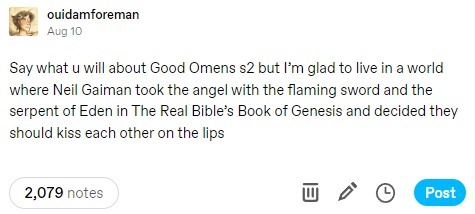
This shot through my brain like a chain of firecrackers, so, without derailing the original post, I have some THOUGHTS to add about why this concept is not only hilarious (because it is), but also...
It. It kind of fucks. Severely.
And in a delightfully Pratchett-y way, I'd dare to suggest.
I'll explain:
As inferred above, both Crowley AND Aziraphale have canonical Biblical counterparts. Not by name, no, but by function.
Crowley, of course, is the serpent of Eden.
(note on the serpent of Eden: In Genesis 3:1-15, at least, the serpent is not identified as anything other than a serpent, albeit one that can talk. Later, it will be variously interpreted as a traitorous agent of Hell, as a demon, as a guise of Satan himself, etc. In Good Omens --as a slinky ginger who walks funny)
Lesser known, at least so far as I can tell, is the flaming sword. It, too, appears in Genesis 3, in the very last line:
"So he drove out the man; and placed at the east of the garden of Eden Cherubims, and a flaming sword which turned every way, to keep the way of the tree of life."
--Genesis 3:24, KJV
Thanks to translation ambiguity, there is some debate concerning the nature of the flaming sword --is it a divine weapon given unto one of the Cherubim (if so, why only one)? Or is it an independent entity, which takes the form of a sword (as other angelic beings take the form of wheels and such)? For our purposes, I don't think the distinction matters. The guard at the gate of Eden, whether an angel wielding the sword or an angel who IS the sword, is Aziraphale.
(note on the flaming sword: in some traditions --Eastern Orthodox, for example-- it is held that upon Christ's death and resurrection, the flaming sword gave up it's post and vanished from Eden for good. By these sensibilities, the removal of the sword signifies the redemption and salvation of man.
...Put a pin in that. We're coming back to it.)
So, we have our pair. The Serpent and the Sword, introduced at the beginning and the end (ha) of the very same chapter of Genesis.
But here's the important bit, the bit that's not immediately obvious, the bit that nonetheless encapsulates one of the central themes, if not THE central theme, of Good Omens:
The Sword was never intended to guard Eden while Adam and Eve were still in it.
Do you understand?
The Sword's function was never to protect them. It doesn't even appear until after they've already fallen. No... it was to usher Adam and Eve from the garden, and then keep them out. It was a threat. It was a punishment.
The flaming sword was given to be used against them.
So. Again. We have our pair. The Serpent and the Sword: the inception and the consequence of original sin, personified. They are the one-two punch that launches mankind from paradise, after Hell lures it to destruction and Heaven condemns it for being destroyed. Which is to say that despite being, supposedly, hereditary enemies on two different sides of a celestial cold war, they are actually unified by one purpose, one pivotal role to play in the Divine Plan: completely fucking humanity over.
That's how it's supposed to go. It is written.
...But, in Good Omens, they're not just the Serpent and the Sword.
They're Crowley and Aziraphale.
(author begins to go insane from emotion under the cut)
In Good Omens, humanity is handed it's salvation (pin!) scarcely half an hour after losing it. Instead of looming over God's empty garden, the sword protects a very sad, very scared and very pregnant girl. And no, not because a blameless martyr suffered and died for the privilege, either.
It was just that she'd had such a bad day. And there were vicious animals out there. And Aziraphale worried she would be cold.
...I need to impress upon you how much this is NOT just a matter of being careless with company property. With this one act of kindness, Aziraphale is undermining the whole entire POINT of the expulsion from Eden. God Herself confronts him about it, and he lies. To God.
And the Serpent--
(Crowley, that is, who wonders what's so bad about knowing the difference between good and evil anyway; who thinks that maybe he did a GOOD thing when he tempted Eve with the apple; who objects that God is over-reacting to a first offense; who knows what it is to fall but not what it is to be comforted after the fact...)
--just goes ahead and falls in love with him about it.
As for Crowley --I barely need to explain him, right? People have been making the 'didn't the serpent actually do us a solid?' argument for centuries. But if I'm going to quote one of them, it may as well be the one Neil Gaiman wrote ficlet about:
"If the account given in Genesis is really true, ought we not, after all, to thank this serpent? He was the first schoolmaster, the first advocate of learning, the first enemy of ignorance, the first to whisper in human ears the sacred word liberty, the creator of ambition, the author of modesty, of inquiry, of doubt, of investigation, of progress and of civilization."
--Robert G. Ingersoll
The first to ask questions.
Even beyond flattering literary interpretation, we know that Crowley is, so often, discreetly running damage control on the machinations of Heaven and Hell. When he can get away with it. Occasionally, when he can't (1827).
And Aziraphale loves him for it, too. Loves him back.
And so this romance plays out over millennia, where they fall in love with each other but also the world, because of each other and because of the world. But it begins in Eden. Where, instead of acting as the first Earthly example of Divine/Diabolical collusion and callousness--
(other examples --the flood; the bet with Satan; the back channels; the exchange of Holy Water and Hellfire; and on and on...)
--they refuse. Without even necessarily knowing they're doing it, they just refuse. Refuse to trivialize human life, and refuse to hate each other.
To write a story about the Serpent and the Sword falling in love is to write a story about transgression.
Not just in the sense that they are a demon and an angel, and it's ~forbidden. That's part of it, yeah, but the greater part of it is that they are THIS demon and angel, in particular. From The Real Bible's Book of Genesis, in the chapter where man falls.
It's the sort of thing you write and laugh. And then you look at it. And you think. And then you frown, and you sit up a little straighter. And you think.
And then you keep writing.
And what emerges hits you like a goddamn truck.
(...A lot of Pratchett reads that way. I believe Gaiman when he says Pratchett would have been happy with the romance, by the way. I really really do).
It's a story about transgression, about love as transgression. They break the rules by loving each other, by loving creation, and by rejecting the hatred and hypocrisy that would have triangulated them as a unified blow against humanity, before humanity had even really got started. And yeah, hell, it's a queer romance too, just to really drive the point home (oh, that!!! THAT!!!)
...I could spend a long time wildly gesturing at this and never be satisfied. Instead of watching me do that (I'll spare you), please look at this gif:
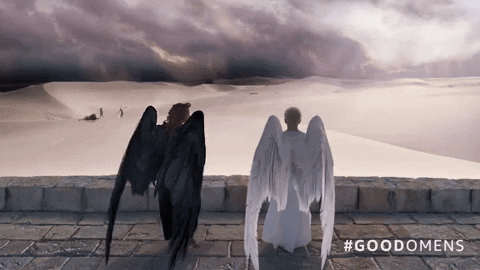
I love this shot so much.
Look at Eve and Crowley moving, at the same time in the same direction, towards their respective wielders of the flaming sword. Adam reaches out and takes her hand; Aziraphale reaches out and covers him with a wing.
You know what a shot like that establishes? Likeness. Commonality. Kinship.
"Our side" was never just Crowley and Aziraphale. Crowley says as much at the end of season 1 ("--all of us against all of them."). From the beginning, "our side" was Crowley, Aziraphale, and every single human being. Lately that's around 8 billion, but once upon a time it was just two other people. Another couple. The primeval mother and father.
But Adam and Eve die, eventually. Humanity grows without them. It's Crowley and Aziraphale who remain, and who protect it. Who...oversee it's upbringing.
Godfathers. Sort of.
#good omens#ineffable husbands#aziracrow#good omens 2#crowley#aziraphale#good omens meta#I have no idea if I've made a coherent point here but I'm tired of this being in my drafts; RAW FEELINGS IT IS#it's about being sent to destroy and instead staying to love and protect and nurture I'M CRAZY I'M CRAZY RAAAAAAAGGHHHH#gnu terry pratchett
27K notes
·
View notes
Text
serenely remembering the moment when isabel fall published "helicopter story" aka "i sexually identify as an attack helicopter", which instantiated harassment from her clouty new-wave scifi friends that radiated outwards into transmisogynist scifi normies and became so severe she wound up in inpatient. people took up the cause of the story in the name of "free artistic expression" and "speaking difficult truths", which was not incorrect but which was kind of missing the forest for the trees in that specific situation: the age-old game of "kill the baby trans girl out of professional jealousy, farm clout off of doing it". the roles could have been completely reversed - the transmisogynist acquaintances could have been writing edgy outsider lit and could have been encouraging mass harassment against her for being a tenderqueer sellout (i swear to god i have seen this shit too). effect would have been the same.
when trans women in FSF talk about this shit, they usually talk about it from the angles of "censorious tenderqueers tried to kill someone over a story" or, in the most sympathetic voice i've seen out of someone in journalism, "public pressure functionally forced this exciting trans writer back into the closet". but they generally miss the degree to which it was intimate, personal transmisogynist violence, which bled into and intersected with the logics of mob justice, of "community safety" (remember, part of the substance of the accusations was that she was a stealth nazi, which frankly knowing a little about both the accusers and IF herself I can say confidently was not just vacuous but knowingly vacuous, them lying through their teeth), and again, professional jealousy.
i have seen people who crowed the loudest about what got done to IF do it to other people. it's the easiest thing in the world, and it happens all the time, and you can do it whenever you want - try and have some weird tranny rival or inconvenient tranny ex-friend killed - and it engenders no moral stain, no whispers, no reputation. i think they don't even have a conception that they're hypocrites. why would they? nothing that happens to anyone like that is real. human life is cheap if it's in the wrong body. everything they hold is stolen, everything they are is negotiable, for everything they do someone else surely deserves the credit. why not you? don't you deserve it more?
3K notes
·
View notes
Text
the thing i really like about just for once in nerdy prudes must die is that it's best iteration of the musical within a musical trope that has become characteristic of the hatchetfield musicals
like both show-stopping number and deck the halls (of northville high) are catchy songs from in-universe musicals that were very much written to have plots that suck
and show-stopping number was so well-beloved because it is, frankly, a hilarious scene that robert manion put 100% into
but i argue that only just for once is thematically relevant to its musical and fully emblematic of the wants and desires of the character singing it
because what is just for once, as a scene? it's ruth singing a song because she thinks she's got a chance of doing it better. it's ruth singing a song about a character who looks back on the mundane miseries of her lonely life and — at the last second — remembering who she used to be before the pain set in. it's ruth singing her version of cooler than i think i am and reflecting on how she is perceived and wondering what it takes to break away from it. it's ruth singing right after she says, "in my dreams, i'm the star of the show."
of all the losers that max jagerman victimizes, only ruth says who she'd like to become beyond that. where pete can't even admit to liking steph at gunpoint and richie doesn't ever get the chance to verbalize what he wants, ruth gets on the stage in the few minutes of break time and just for once, the spotlight is on her.
and the really crazy thing about just for once is — it has the "i'm not a loser" motif. possibly the most iconic and important motif of the whole musical, it's the motif that starts the opening number. and here it is, in the silly musical within a musical by the silly character who has — until this song — always served as comic relief.
in the climax of the song, just for once is no longer the song of a character from the barbecue monologues. it's ruth's. in those few seconds, it's her lamentation of the life that max jagerman forced on her.
but that's the thing about the "i'm not a loser" motif. the way it functions in the musical is as a harbinger for max's violence. the police at the beginning ask, "what the hell happened here?" and its the motif that answers. pete is the first character that sings the line and is immediately beaten up by max in the next scene. then richie sings it and max kills him in the same song. when ruth has the motif running as the crescendo to just for once, it sounds absolutely incredible... and it should come as no surprise when max appears shortly after.
(as a quick note: you can also hear the motif after max makes the car crash, then max appears two scenes later. you then hear the motif in the cooler than i think i am reprise and max also appears right after the song. it's like max is instantly summoned by any instance of the losers trying to shake off the role he placed on them — of trying to defy him.)
tl;dr: the inclusion of the "i'm not a loser" motif in just for once makes it the big lipped alligator moment that wasn't. like yeah, it accomplishes its goal in being the funny musical within a musical trope! the character acting makes it a funny song, and its a funny character performing it! but it also furthers our understanding of ruth AND of what the "i'm not a loser" really is: it's the characters trying to develop past being nerdy prudes and max doing everything in his power to prevent that.
and it does all that while being a banging musical tribute to stephen sondheim and, especially, his song the ladies who lunch. which in itself is a massive flex on jeff blim's part. what a brilliant song in a brilliant musical.
#npmd#nerdy prudes must die#starkid#hatchetfield#mine#i just love this song okay????#anyway i just want to say#nerdy prudes must die is on youtube!!! go watch it!!!!
1K notes
·
View notes
Text
me and den @unloneliest were just talking about murderbot and ART's relationship and i want to discuss how they quite literally complete each other's sensory and emotional experience of the world!!
there's a few great posts on here such as this one about how murderbot uses drones to fully and properly experience the world around it (it also accesses security cameras/other systems for this same purpose). but i haven't seen anyone so far talk about how once MB stops working for the company and consequently doesn't have a hubsystem/secsystem to connect to anymore (which for its entire existence up to that point had been how it was used to interacting with its environment/doing its job), after it meets ART, ART starts to fill that gap.
ART gives MB access to more cameras, systems, and information archives than it would normally be able to connect with while MB is on its own outside of ART's... body(? lol), but also directly gives MB access to its own cameras, drones, archives, facilities, and processing space. additionally, so much of ART's function is dedicated to analysis, lateral thinking, and logical reasoning, and it not only uses those skills in service of reaching murderbot's goals, it teaches murderbot how to use those same skills. (ART might be a bit of an asshole about how it does this, but that doesn't negate just how much it does for murderbot for no reason other than it's bored/interested in MB as an individual.)
we all love goofing about how artificial condition can basically be boiled down to "two robots in a trench coat trying to get through a job interview" (which is entirely accurate tbh) but that's also such a great example of ART fulfilling the role of both murderbot's "hubsystem" and "secsystem", allowing it to fully experience its environment/ succeed in its goals. ART provides MB with crucial information, context, and constructive criticism, and uses its significant processing power to act as MB's backup and support system while they work together.
from ART's side of things, we get a very explicit explanation of how it needs the context of murderbot's emotional reactions to media in order to fully understand and experience the media as intended. it tried to watch media with its humans, and it didn't completely understand just by studying their reactions. but when it's in a feed connection with murderbot, who isn't human but has human neural tissue, ART is finally able to thoroughly process the emotional aspects of media (side note, once it actually understands the emotional stakes in a way that makes sense for it, it's so frightened by the possibility of the fictional ship/crew in worldhoppers being catastrophically injured or killed that it makes murderbot pause for a significant amount of time before it feels prepared to go on. like!! ART really fucking loves its crew, that is all).
looking at things further from ART's perspective: its relationship with murderbot is ostensibly the very first relationship it's been able to establish with not only someone outside of its crew, but also with any construct at all. while ART loves its crew very much (see previous point re: being so so scared for the fate of the fictional crew of worldhoppers), it never had a choice in forming relationships with them. it was quite literally programmed to build those relationships with its crew and students. ART loves its function, its job, and nearly all of the humans that spend time inside of it, but its relationship with murderbot is the first time it's able to choose to make a new friend. that new friend is also someone who, due to its partial machine intelligence, is able to understand and know ART on a whole other level of intimacy that humans simply aren't capable of. (that part goes for murderbot, too, obviously; ART is its first actual friend outside of the presaux team, and its first bot friend ever.)
and because murderbot is murderbot, and not a "nice/polite to ART most of the time" human, this is also one of the first times that ART gets real feedback from a friend about the ways that its actions impact others. after the whole situation in network effect, when the truth of the kidnapping comes to light and murderbot hides in the bathroom refusing to talk to ART (and admittedly ART doesn't handle this well lol) - ART is forced to confront that despite it making the only call it felt able to make in that horrifying situation, despite it thinking that that was the right call, its actions hurt murderbot, and several other humans were caught in the crossfire. what's most scary to ART in that moment is the idea that murderbot might never forgive it, might never want to talk to it again. it's already so attached to this friendship, so concerned with murderbot's wellbeing, that the thought of that friendship being over because of its own behavior is terrifying. (to me, this almost mirrors murderbot's complete emotional collapse when it thinks that ART has been killed. the other more overt mirror is ART fully intending on bombing the colony to get murderbot back.)
in den's words, they both increase the other's capacity to feel: ART by acting as a part of murderbot's sensory system, and murderbot by acting as a means by which ART can access emotion. they love one another so much they would do pretty much anything to keep each other safe/avenge each other, but what's more, they unequivocally make each other more whole.
#the murderbot diaries#murderbot#asshole research transport#network effect#mine#idk what else to tag lol#BIG thanks to den unloneliest for helping so much with the drafting/editing of this!!!#we both were having some brain fog issues yesterday so we joked that with our combined forces we can make one (1) post lol#just like mb and ART fr!!!!#anyway im so fucking emotional over themmmmm#murderbot meta#the murderbot diaries meta
561 notes
·
View notes
Text
I've always really liked DC's in-house choice of referring to their various superhero groupings as "families," but it has gotten a little frustrating recently with people both in canon and in fandom seeming to forget that families aren't just a parental-unit-and-kids formation. They're complicated, and a lot of the DC families are too messy to fit into that neat little nuclear family mode.
Which is to say... here's some scattered thoughts/summaries about how these families are actually structured in canon, because I think it's interesting:
Supers -- The smaller, more traditional Superfamily (Clark, Lois, Kara, Kon, etc.) is a pretty traditional Midwestern nuclear family, with Jimmy Olsen filling the role of close family friend/goofy neighbor sidekick (in the Silver Age, he was Kara's would-be suitor) and Steel feeling more like part of Clark's personal circle of friends. The recent line up, though, with Jon, the twins, Kong and Nat? Starts to feel more like some old dynasty or noble house, complete with fostered foundlings and the Steels acting almost like knights under a noble's banner, possibly reflective of what the House of El would have been on Krypton.
Arrows -- Might currently be the closet to a traditional nuclear family structure. You've got Ollie and Dinah, their younger sisters, Ollie's adopted and biological children, and Ollie's granddaughter through Roy, plus by some counts Roy's co-parent and her sister as "in-laws." Bonnie and Cissie King-Jones are adjacent to but not technically "part" of the family, though I believe it's implied at one point that Ollie might also be Cissie's bio-dad. Pretty straightforward, these guys are actually family and they act like it, for good and ill.
Shazam Family -- Also a literal, actual family. Not originally, the original golden age "Marvel Family" was considerably more complicated and only Billy and Mary were full siblings, but nowadays the whole point of the modern Shazam family is that they're foster siblings united by familial love and that's fantastic. Meanwhile your average Black Adam story is 75% angsty family drama, 25% Egyptian mythology references.
Flashes -- Technically closer to three nuclear families (the Allens, the Wests and the Garricks; four if you include the Quicks), two of whom are united by marriage and all of whom are bound by the Speedforce, which, given its semi-spiritual connections to things like Speedster afterlives, can act almost like a religious force that connects them to the additional members like Avery, Circuit Breaker and Max as Bart's foster-dad. They're a big, sprawling tree with more cousins than siblings, the kind of family that functionally has a reunion every Christmas and Thanksgiving.
Lanterns -- Now these guys are the exception that proves my point about the whole 'family' thing not being straightforward. The lanterns aren't a family, they're a corps. Soldiers. Space cops. Comrades-in-arms. They respect each other, have each other's backs, might even like or care about each other, but those last two are optional, and they don't have the same kind of assumed obligations towards each other that a family would have. They're friends and co-workers, not family, but that doesn't mean their relationships are less significant, they're just different.
Wonders -- Roughly half of them are either one of Hippolyta's daughters (Diana, Donna, Nubia pre-Crisis) or related to them through the gods (Cassie), and the other half (Artemis, Yara, modern-age Nubia) use sister as a term of endearment more in a utopian lesbian commune kind of way. I think they brought Steve Trevor back recently? He's basically the Ken in this equation and perfectly fine with that role. None of which should be surprising if you've seen Professor Marston and the Wonder Women.
Bats -- This is the one that people get really wrong when they try to force it into a traditional family structure. Don't let WFA fool you, the Bats are and have always been way more a snarled mess of tangled interpersonal relationships than they've ever been a cohesive family. Whether Dick is Bruce's son or his brother depends on what era you're talking about, and the former reading is much more recent than you think -- as in "started cropping up in the early 2000s" recent. Barbara is both Cassandra's sister and her mother. Duke and Steph both have living parents and neither of them want or would ever dream of treating Bruce like their dad; Tim was the same way until his dad died. None of the Robins ever lived in the mansion together, nor did Cass. Babs considered Jean-Paul Valley her brother and Huntress is so close to Tim she once hallucinated him calling her Big Sister. They're a beautiful mess of people finding places where their broken edges fit together into something that works for them and trying to reduce it down to a cozy nuclear family is just so goddamn reductive and lazy.
Blue Beetles -- Are only tangentially related to each other. Seriously, they never even get direct mentoring, each one just takes over when the previous one dies and works on completely different rules from the other two. They're complete strangers bound by a legacy and that's honestly pretty fun.
Zataras -- There's only three of them and they're literally a father, daughter and cousin.
Martians -- Not really a family because there's only the two of them, but an interesting case where the two survivors of what was functionally a war of mutually assured destruction came together in an attempt to find some peace in the aftermath of what they'd lost.
Titans -- The JLA and JSA aren't really in the "family" category, but the Titans lean into it hard, mostly because they're a textbook found family. They don't mirror a nuclear family structure, they're simply a group of people who came together to form a mutual support network. They're the idealized college friends you grew into your own with, some of them childhood companions and others you only met once you leave home for the first time, but all of them friends that you manage to maintain contact with for life, with everyone coming back together even as you scatter and do your own things.
Young Justice -- Meanwhile, this team is the chaotic group of misfits you hung out with when you were a teenager, especially when you were just starting to be allowed to act without adult supervision. You drive each other crazy, none of you know you're all queer as fuck, and you'd fight a bear for any of them even if they asked you not to. They'd probably be insulted if you tried to call them a family. They come out here to get away from their families, thank you very much.
#dc comics#meta#batfamily#super family#arrow family#flash family#wonder women#shazam family#batman#superman#wonder woman#green lantern#teen titans#young justice#kinda rambling#just kinda throwing some ideas together#families of choice#non-traditional families
813 notes
·
View notes
Text
My forever headcanon is that the reason Ruby is Like That is because after Summer left and Tai shut down and Yang had to grow up too quickly, Ruby kind of slotted into this role of "child that needed to be ok for things to function."
As in, Ruby learned very quickly that if the food was a little burnt and Yang was on the verge of tears because of it, she chokes it down with a smile on her face. Or Tai forgot to get groceries again and they have to order the same takeout food for the third time even if she's sick of it, she picks around to make it look like she's eating a lot and tells her dad it's ok. Or she had to stay at school for an extra hour because both of them were too busy to pick her up right away, she stays on the steps doodling in her notebook and waiting patiently.
Tai needed to heal and get his shit together, Yang needed to be everything Tai wasn't being and try and be herself at the same time, and Ruby needed to be ok. Because if she wasn't then the other two might just break even worse. So she grits her teeth and she swallows her complaints and she tries so hard to be good and not add to the stress.
And after everything was finally beginning to heal, when she was old enough to care for herself and Tai was functioning like an adult again, she just never knew when to stop.
2K notes
·
View notes
Text
I know this is old hat to just about everyone, but I'm more and more enjoying Imogen and Laudna as not just a mirror of the Briarwoods but also, and perhaps even more so, as a foil.
Laudna may be the death magic goth with a necromancer in her head, but out of the two of them, Imogen is the stronger mirror of Delilah. She’s the one with the undead lover, the one prepared to break the world by risking Delilah's return as long as it got her Laudna back, the one with the drive and the thirst for power and knowledge. Laudna meanwhile, while also tempted by power, is mostly just along for the ride, deeply devoted to Imogen over anything or anyone, alive only because Imogen found a way to resurrect her. They have looked each other in the eye, recognised the same seeds of darkness and the possibility of giving in, and said 'Together either way'.
But they are also in many ways a direct subversion of the Briarwoods. Delilah and Sylas both seemed perfectly happy to have made a pact with Vecna and revelled in the power he granted them, even knowing the disaster he would bring and the horrific acts he asked of them. Imogen and Laudna meanwhile, while tempted by power and openly voicing said temptation to each other, actively fight against it. Imogen was prepared to risk Delilah's return for the sake of Laudna's resurrection, but she would've fought her every step of the way. She's tempted by the power and knowledge of Ruidus, but also prepared to give all of it up if it means saving the world, because unlike Delilah she chooses to care about people other than herself and her lover. Laudna may be prepared to follow Imogen into hell itself, but she may also be what would lead her back out, because unlike Sylas she doesn’t just recognise darkness in her lover, she wants to fight it alongside her.
This is what I mean when I say these two hold the potential for great darkness. They wouldn’t function as a mirror and a foil of the most romantically iconic critical role villain duo if they didn't. But holding the potential for darkness and corruption also means holding the potential to resist and fight said darkness at every turn. It gives them the potential to choose kindness and struggle while still keeping a little bit of that darkness in their hearts, because without it, they never would have found each other.
#critical role#imogen temult#laudna#cr3 spoilers#imodna#southern gothic#cr3#i still get weirded out by the way large swaths of shippers will happily compare imodna to the briarwoods because#'ooh romance and aesthetic and breaking the world for each other ~~'#and yet will completely lose their shit when someone actually engages with the darker aspects of their characters#and talks about their relationship as anything other than perfect and fluffy and supportive#guys. the potential darkness is what makes them interesting. it's where the flavor comes from. embrace it#I'm hoping for more moments where they give in a little to that dark the way laudna did when killing bor'dor#i mean laura even said last 4sd that imogen very well might next time because she Wants To Know!!#please go there miss bailey I'm begging it would be such an interesting turn for both imogen and laudna!#delilah briarwood#sylas briarwood#nella talks cr
608 notes
·
View notes
Text
Let’s Talk About the Ferris Wheel
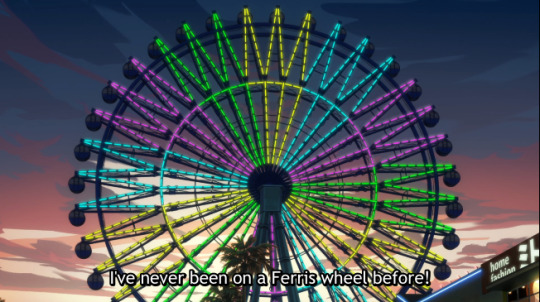
This scene in the Ferris Wheel is incredibly intimate. We have Kazuki and Rei actually communicating with each other and discussing seriously about the current situation they are in. But, before that, let’s take a moment to talk about this sequence of events with Rei and Miri.
Miri asks Rei:
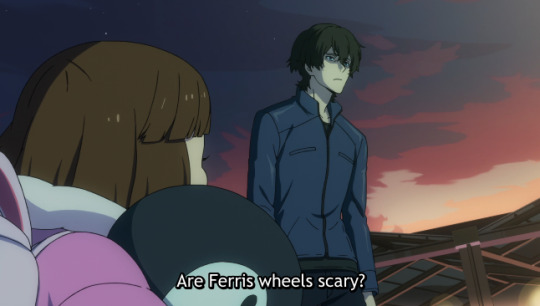
“Are Ferris wheels scary?” And Rei tells her no, that they aren’t.
Once they’re on the Ferris wheel, Rei asks Miri:

“It’s not scary?” And Miri replies that it’s not.
This is interesting dialogue, because for Kazuki and Rei, this Ferris wheel ride probably is quite scary, right. An adult fear: losing a child they’ve come to care for and have become attached to.
But, the narrative is telling us that: The Ferris wheel is NOT scary.
Hopefully, this means that we don’t have to be scared about the future plotlines, maybe shocked and surprised, but not scared.
Of course, we can also look at the projection of the Ferris wheel and the conversations and dialogue as being related to the plot structure of the series so far, and the mindset of the characters at those junctures.
Right, before they got on this ride of caring for Miri, the thought was rather scary, because they were both out of their depths. Then, we get a shot of the carriage they are in, and it rising up the Ferris wheel:
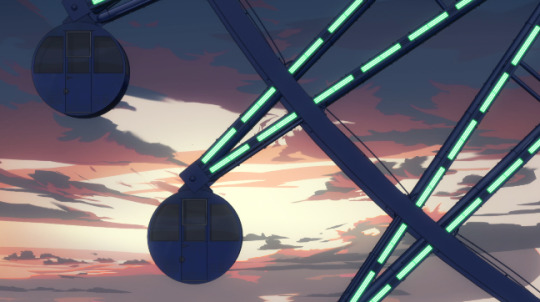
It’s after this that we have Miri responding to Rei that it isn’t scary. This is around the time the two decided to be her papas and started getting comfortable within their roles as being Miri’s papas. Around Episodes 3 - 6. Seeing them become more and more like a family with each passing episode was beautiful (still is).

As they’re getting closer to the very top of the Ferris Wheel, Kazuki brings up the cat. A difficult conversation, one that deals with attachment. In Episodes 7 - 8, that’s when we really see Kazuki and Rei’s decision to devote themselves to Miri and their family come into full force.

Their attachment with Miri really kicks in around Episodes 7 - 9, this is when they start thinking about placing Miri first, like Kazuki mentions here:
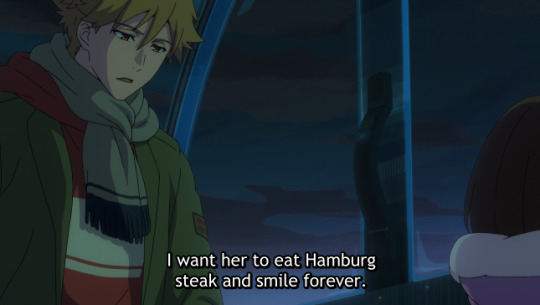
He talks about wanting her to eat Hamburg steak and smile forever. He’s placing her happiness first. That’s an extremely parental view. Kazuki is expressing the practical side of parenthood, while Rei’s expression here, the sound of upset he makes:
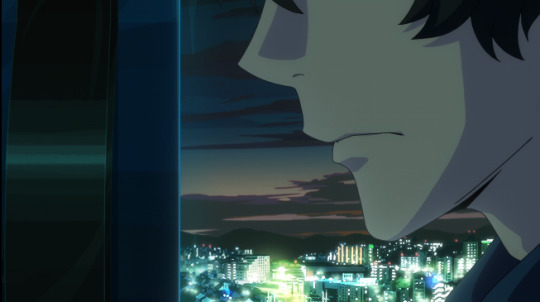
Highlights the emotional and painful side of making such a decision. Rei’s never felt emotional attachment like this before, never had to lose it either. Kazuki has, though it was unintentional and not the same as this situation.
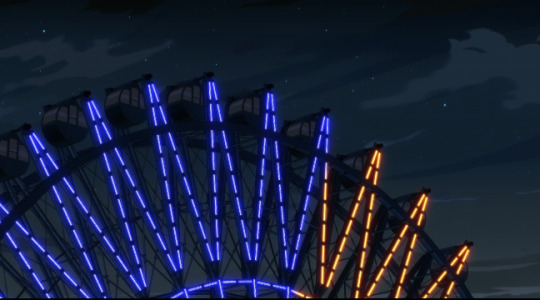
The Ferris wheel is now shown to be at the top. The climax, episodes 9 and 10. Episode 9 was the climax of them becoming a family unit - Kazuki and Rei had worked through their individual demons and both picked returning home to their family. And in Episode 9, we see Miri acknowledging Kazuki and Rei as her family. That was the climax to the “family” side of the series.
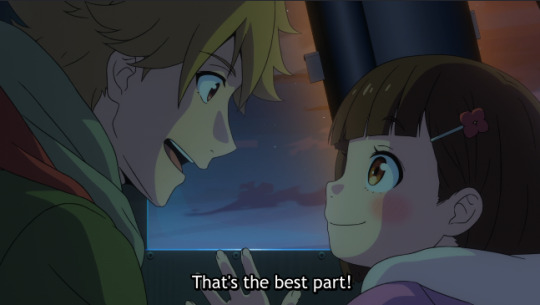
Kazuki tells Miri, when they reach the “tippity-top” that: “That’s the best part!” And, it was! Episode 9 was so, so heartwarming.
But, this week’s episode, Episode 10, is in the falling action. The part where shit gets tough again. Just like it got tough for Kazuki and Rei in the rising action of Episodes 7 & 8, it’ll get tough for them again in Episodes 10 & 11, possibly 12, too. The difference being that this time they are facing it together, instead of separately.
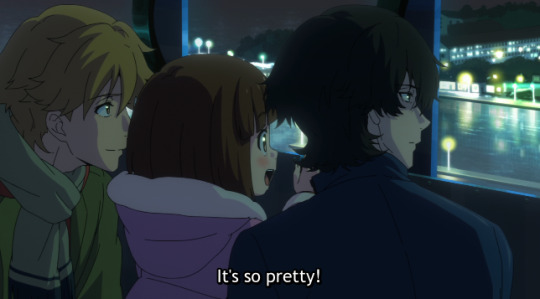
Kazuki acknowledges that he’s gotten more than he thought he ever would thanks to Miri:
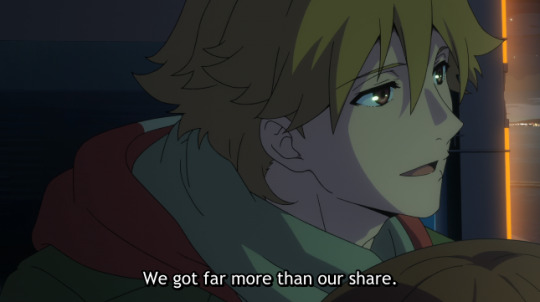
And Rei’s grown a lot emotionally because of Miri, experienced things he never thought he would. He’s become a much more functioning person since she’s come into his life:

For them, this seems and feels like the end of the ride. But, it’s not. The Ferris wheel is still in the falling action stage:
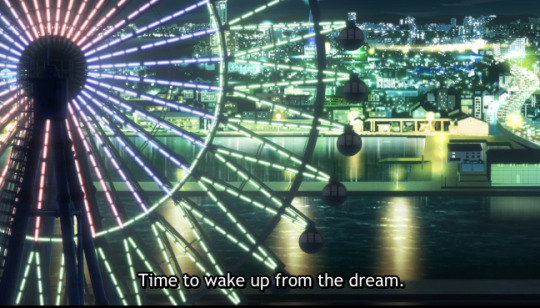
They haven’t gotten off the ride yet. And we don’t see them get off the ride (we just see them after it’s done). Kazuki says, “Time to wake up from the dream,” as they are going down. But waking up from a dream is different from a dream ending.
In the previous acts of the series, Kazuki and Rei were aware of the dangers their job and situation with Miri could place Miri in, but they weren’t facing the realities of their situation either.
Now the story is in the falling action, the characters are facing some harsh realities:
About their job.

About society.
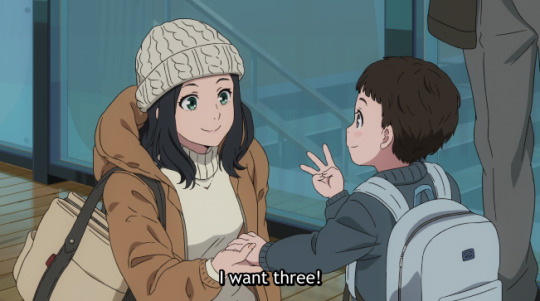
About Miri’s birth mother.

Buddy Daddies is a series that wants to explore the themes of “a bloodless family” and “two people of the same sex raising a child,” and they are doing it in modern day Japan. Not in a fantasy world, not through metaphors, and with a foundation based in some level of reality.
This series is exploring tough themes that aren’t always easily accepted or easy to navigate in real life. These ideas can be challenging, and right now, our main characters are experiencing that.
Pushback.
Kyutaro with his hard truths about the messiness of Miri’s parental situation, of them killing her birth father, and the fact that these issues are going to eventually catch up to them.
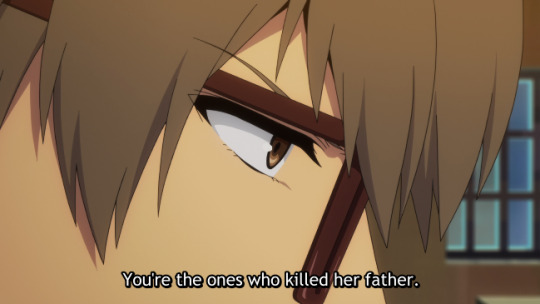
Misaki reiterating that danger, and having the lawful advantage of being Miri’s blood, while Kazuki really takes in the reality that society, especially Japanese society, still centers motherhood when it comes to childcare.
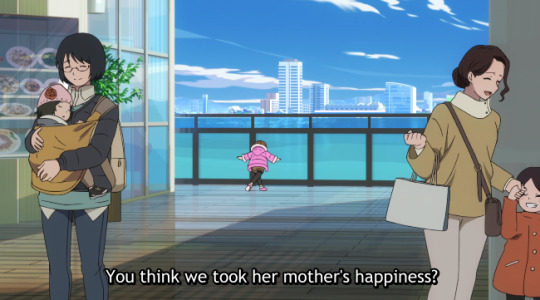
But, like I stated, this is still just the falling action. It’s not the conclusion. There are three more episodes left.
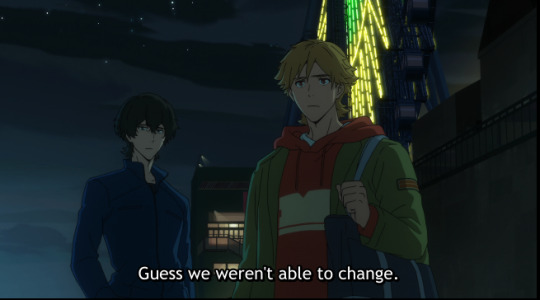
There is still time for them and things to change. But, like Kyutaro stated back in Episode 5, it still remains to be seen if these changes that will come will be for the better or worst.
#Buddy Daddies#BD#Kazuki Kurusu#Rei Suwa#Miri Unasaka#Kyutaro Kugi#Misaki Unasaka#BD spoilers#Buddy Daddies spoilers#long post#image heavy post#meta post#analysis#story structure
1K notes
·
View notes
Note
I've got a world-building/combat question. I have these two warring nations in my setting, both medieval-ish tech levels. One of them figures out how to make magical flying craft that are basically WWI airplanes. The other country invents dragon riders in response. Since then, they've been at war for ~60 years. I'm trying to figure out how the heck an air force would alter medieval combat strategies. If you've any suggestions, I'd appreciate it
The first, and biggest world building problem is that magic is part of your overall tech level. Ironically, Diskworld is an excellent example of how magical technology can basically function as an alternate path for social and technical development, though, honestly, a lot of high-magic settings tend to have tech leakage from magic.
One of the more common examples that comes to mind are “magical radios.” Either it's an enchanted device that allows person to person communication, or it's direct telepathic communication, but whatever it is, it serves a fundamentally similar role to a handheld radio, or (depending on how it works) a phone. The thing is, it's functionally a magical replacement, and it would affect society in much the same way those technologies have.
This is a long way to say, if your magical combat technology has WWI-grade planes, there is a very real possibility that a lot of your warfare is also going to be at a similar magi-tech level, if not more advanced. Having written that, I'm reminded of The Red Star comic series; though, that has a heavy Soviet aesthetic, and is not-at-all medieval.
Again, it doesn't really matter if you have fully-automatic firearms, or if you have a bolt thrower that conjures and propels crystals at hyper-sonic speeds into your foes. If they have a similar rate of fire, and similar accuracy, the meaningful change is texture. Your characters might see tiny crystal fragments shattered on the floor, or embedded into walls, instead of bullet holes. There may be no smell, or conjuring the crystals might leave a different odor. A handheld lightning projector might leave scorch marks, and a scent of ozone, for instance.
Magic might also factor into armor and defenses. If you can use a magical ward to dispel conjured objects, that might be extremely useful for fortifying specific targets against incoming conjured attacks, but it would likely be wholly ineffective against the lightning projector, or some other kind of directed energy beam weapon.
“Inventing,” dragon riding as a response to someone else making a magical airship, does strike me as an odd cause-and-effect. If dragon riding was that easy, it would seem likely that someone would have militarized them long before that point. Inventing flying objects that could function as a hard counter to dragons feels a little more natural. Or, magical, AA installations. Though, this is something that could probably be finessed, if you're really committed to the setup. It's also worth remembering that air superiority is an extremely potent advantage, even if you're not sure what to do with it, meaning that if one side suddenly had fliers, and the other side couldn't come up with a counter in short order, they'd be picked apart, and the war wouldn't have this 60 year timescale.
If it seems like I went to ranged weapons very quickly, there's a simple reason. You can't joust from a plane. Your options are to either propel objects at people, or drop things on them from above. Dragons also (usually) have the option to breathe fire on them. Now, firearms did exist in the late medieval era. So, that's not that far out of range. I'm less sure of the invention of bombs. At least, of the variety you could deliver to your enemy on the battlefield. Though, it occurs to me, you could probably use a catapult or trebuchet to deliver an explosive payload, if the explosives were stable enough to survive launch, but sensitive enough to detonate on impact. (Of course, if you have some kind of magically primed explosive, that stays stable until it is ejected from the catapult, and then explodes on impact, that would work.)
Looping back to the timescale again, this would require some pretty potent defensive capabilities. A dragon, with the ability to breathe fire, and the capacity for strategic thinking, could easily starve out an entire kingdom, simply by making a habit of torching all the cropland it could find. It doesn't, particularly matter if it gets all the food, so long as it torches a meaningful percentage of the available crops. When you have farmers going hungry, you're going to see food production dipping, exacerbating the problem. When you have soldiers going hungry, they're not going to be able to fight as effectively. When you have the peasantry going hungry, you're going to see civil unrest, and probably rebellions coming for their lord's head. You can't wage a war against a hostile nation under those circumstances. (In fact, there were multiple peasant revolts during the Hundred Years War, which basically stalled out France's ability to fight. England also suffered multiple peasant uprisings at roughly the same time. Though, those were motivated by taxation, which ends in a similar place.)
A related concept that's somewhat hinted above, is that wars are expensive, and both France and England found themselves facing uprisings because of taxation needed to support the ongoing war. (The irony being that both nations encountered this at roughly the same point in history. Roughly 40 years into the war.) A war that's been going for 60 years will likely have ravaged the economies of the involved nations. This isn't necessarily something that your characters would be aware of, unless you expand the context to show non-wartime economies.
The simplest explanation for why this happens is that any money you spend prosecuting the war are products that you never see returning value from. The money itself doesn't leave the economy, but the natural resources, and labor required, are expended non-productively (from the perspective of economic growth.) So, if you have a peacetime merchant, they're moving money around, but they're paying for their goods, and then those goods are going to consumers, who may also be contributing to economic activity with those goods (this even applies for food, you can think of that as a necessary component to any productive activity.) If you're a wartime merchant, selling weapons to the military, you are contributing to economic activity when you buy the weapons, but when they're sold to the crown, that's no longer productive. Those weapons leave the economy and never return. Worse, any soldiers who are permanently wounded, or killed, are also removed from the economy. Over time, this can destroy the most prosperous of nations. (To be clear, this is more advanced economic analysis than anyone in the middle ages would have had. So, the idea that wars are expensive was understood, but the exact reasons it slowed the economy were not.) And, this kind of thinking is another form of technological advancement. Ideas for understanding complex systems have become more intricate and detailed over time. While it's not the concept of, “invention,” that you might be used to, it is a similar form of progress.
So, how would this look in your world? There's a lot of potential consequences, most of which are not contradictory.
An impoverished lower-class is very likely. Whether that includes wounded veterans or not is a little more up in the air, though after 60 years, military pensioners, and those who suffered life-altering injuries on the battlefield are likely to be a common sight, either on the street or in the poverty line. (Especially if the crown is willing to enforce drafts and conscription.) At this point, that might be a very real possibility.
A struggling aristocracy is also likely, with former major power players who've declined into poverty. This might take the form of borderline abandoned estates that have been taken over by the crown or squatters. (Probably not both at the same time.)
Serious inflation is likely (and could be why formerly stable guild members, merchants, and even some of the aristocracy might now find themselves struggling.) I realize this point isn't something most really think of when you're trying to write a fantasy world, but it's worth considering. More likely this will be seen in food prices having increased over time. So the major symptoms you'd likely see would be decaying structures that no one has the resources to maintain, rising food prices, and generalized poverty. Even in a fairly magically advanced setting, a lot of these things would, likely, still happen. Of course, if the dragons have been used to destroy the agricultural base, things would be even worse in that nation. To be clear, food and taxation riots are not off the table there.
This is sort of a non-sequitur, but if you have a setting with classic transmutation (lead, or other base metals, into gold), you would actually see inflation with every batch of transmuted gold hitting the market. It's sort of an amusing note on the fantasy of being able to produce as much money as you want, but ultimately, it's actually harmful from a macroeconomic perspective. (Basically, the same reason counterfeiting is a problem.) Though, it is a possible hook for criminal groups in one of those nations, producing counterfeit gold via transmutation.
There's also a real world example from 2020, where a jewelry company had fabricated “fake,” gold bars as collateral to secure loans. In total, they claimed to have 83 tons of gold used to obtain loans worth over 2.8 billion dollars, from 14 different creditors. Except, when they defaulted on those loans, and were forced to hand over the gold, it was discovered that these were in fact gold plated copper bars.
I realize the question was about the flying forces specifically, but so long as that advantage is dealt with quickly, and neither side is able to monopolize air superiority, that's not going to change nearly as much as having that level of magical advancement would on its own, and of course, the general consequences of having a war that's been going on for long enough that multiple generations have died on the battlefield. That's going to a bigger effect on your world as a whole.
-Starke
This blog is supported through Patreon. Patrons get access to new posts three days early, and direct access to us through Discord. If you’re already a Patron, thank you. If you’d like to support us, please consider becoming a Patron.
#writing reference#writing advice#writing tips#how to fight write#starke answers#Starke is not a real economist
201 notes
·
View notes
Text
["The entwined nature of neuronormativity and heteronormativity means that the compulsory performance of neurotypicality is never a gender-neutral performance, but instead is strongly tied to the performance of binary heteronormative gender roles. Normative performance of whichever gender one was assigned at birth is central to what it means to be "normal" in the eyes of the present dominant culture. Thus, when the enforcers of normativity demand that a child "act normal," it's ultimately a demand to either act like a "normal boy" or like a "normal girl," whether or not the demand is explicitly phrased that way.
Since normative performance is always gendered, deviations from neuronormative embodiment are also inevitably deviations from heteronormative embodiment. Whether a given deviation gets interpreted by the enforcers of normativity as a violation of neuronormativity or as a violation of heteronormativity often depends entirely on context and circumstances. In a context in which a child is known to be autistic (or neurodivergent in some other specific and culturally pathologized way), the child's non-normative usage of their hands is likely to be pathologized as a "symptom" of their neurodivergence. But in a different context, those who are policing the child's embodiment are unaware of the child's neurodivergence, the same non-normative hand movements might be flagged as gender violations: children whom adults have labeled as girls might be reprimanded for drumming on the table with their hands or running their fingers vigorously and repeatedly through their hair, on the grounds that such actions are "unladylike"; children whom adults have labeled as boys might be attacked or ridiculed for flapping their hands, on the grounds that such gestures are "gay."
Thus, there are some autistic people who were forced in childhood to suppress their natural hand movements because those hand movements were flagged as "symptoms of autism" and targeted for elimination by autistiphobic adults, and other autistic people who weren't recognized as autistic in childhood but were still forced to suppress their hand movements because those hand movements were violations of heteronormativity that got them targeted for homophobic and transphobic abuse by adults and/or peers. And of course, there are many who were targeted on both neuronormative and heteronormative grounds at different times— e.g., autistics who in their youth were abused by adults for moving their hands autistically, and by homophobic peers who read those same hand movements as queer. The professional ABA perpetrator and the homophobic schoolyard bully are ultimately in the same line of work, enforcing the same compulsory normativity from different angles.
Since distinctively autistic movements of the hands violate the rules of both neuronormative performance and heteronormative performance, to refuse to suppress such movements functions as a simultaneous queering of both neuronormativity and heteronormativity. When an autistic person chooses to allow themselves to follow some or all of the impulses toward non-normative hand movement that spontaneously arise in them, rather than suppressing those impulses in the interest of normative performance, that's a form of neuroqueering."]
nick walker, from neuroqueer heresies: notes on the neurodiversity paradigm, autistic empowerment, and postnormal possibilities, 2021
1K notes
·
View notes
Text
Illyasviel von Einzbern: The Hole at the Center of Fate/Stay Night
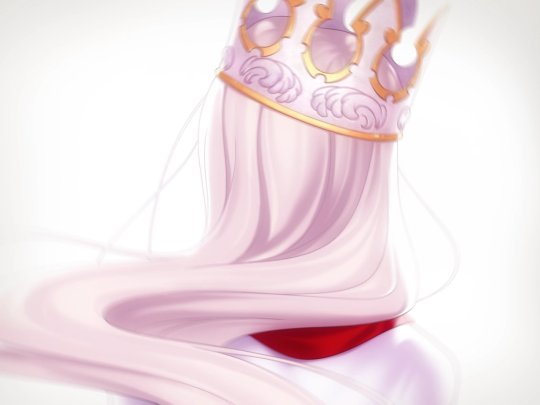
Emiya Shirou is the beating heart of Fate/Stay Night. Every character radiates outwards from Shirou, shapes and is shaped by him. He fights against foils like Archer and Kirei while growing alongside the three main heroines in each route.
There's really only one character who precedes Shirou in influence, who shapes him near-completely but cannot himself be shaped.

Emiya Kiritsugu is already dead, after all.
It's his legacy that drives the novel - but something oft-undiscussed is that Shirou only has half of it. He inherits his father’s justice, and the one that inherits his ruthlessness is Illya. Thus, Illya’s relationship to Shirou is dictated from the start.
She is everything his father left behind, the first gatekeeper of the moonlit world of death and magecraft that Shirou now finds himself in. In this role she transcends routes, appearing at the end of the third day to deliver a near-lethal attack just as the story branches off.

She seems intent to deliver Kiritsugu’s baggage to Shirou, to make him reckon with the past that he himself never experienced; the truth that a hero can only help those he sides with while many others are left alone in the cold.
In this way her very existence is a far more fundamental challenge to Shirou’s ideals than that of any other character - and yet this challenge is met only indirectly. Much of the information regarding her true identity and relationship to Shirou is elided until the end of HF.
She functions similarly to Sakura, a character who totally changes the reader’s perception of the first two routes in retrospect. The reveals about Illya force us to reevaluate how positive her ending in the Fate route really is.
In the narrative of Heaven’s Feel, both Illya and Sakura are considered ‘doomed’ - able to be saved only by Shirou sacrificing his own life to Archer’s arm.
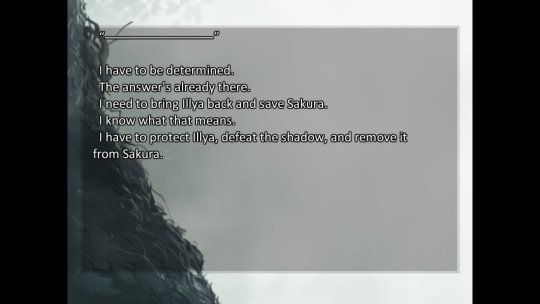
It’s the crux of their characterisation, in the same way that Saber’s pursuit of the Holy Grail leads her into timeless and uncountable doomed battles. In a route based around that character, you would expect fixing it to be the main thrust of the plot.
And so just as the Fate route is focused on Shirou clashing with Saber over her lack of regard for her safety, and Heaven’s Feel is focused on accepting even the ‘impure’ parts of Sakura, there is no route focused on showing Illya that she needn't give up on having a normal life.
Instead all of her scenes in Heaven’s Feel are about accepting that she cannot have one.
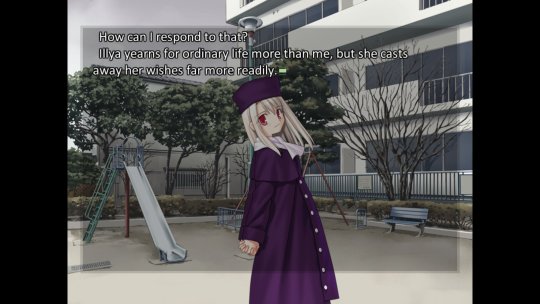
This is the hole in the center of FSN that I’m talking about. Its absence is felt keenly throughout the novel, because Illya has another role besides a specter of Shirou's past. She embodies the prize and object of the Holy Grail War itself - the very same wish-granting device.
Many of the characters in this story are not fighting for the Grail specifically, but nonetheless their strong personalities and desires cause them to clash with one another, in a process Kirei sees as comparable to everyday life.
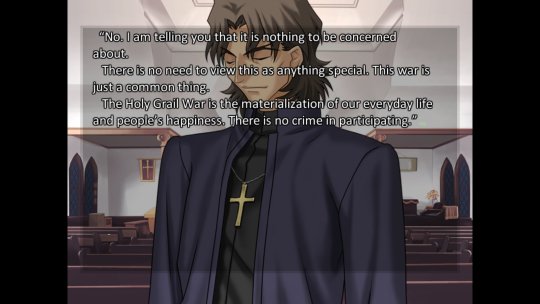
Their wishes, both in the form of the dead’s regrets and victor’s will, enter the neutral, empty Grail in order to produce a miracle. The only one not allowed a will of their own is the vessel of the Grail, who, in absorbing these desires, must completely erase their humanity.
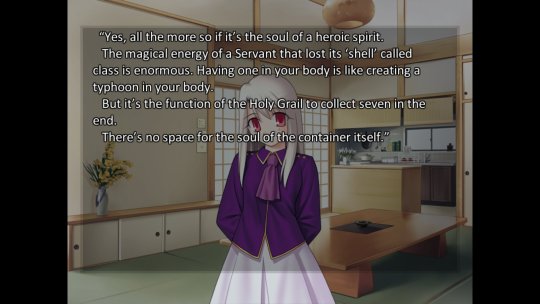
Illya is not intended to have a reason to pursue the Grail, nor any life beyond obtaining it. The war is premised on the sacrifice of the Servants, yes, but nonetheless they enter as contestants. Illya, like Justeaze before her, enters the ritual only as a sacrifice.
And yet an outside element is introduced. Illya being part-human, the product of an actual family rather than just a clone allows for her to have personal motivations. She holds on to her resentment of Kiritsugu, despite knowing that it’s pointless, because it’s all she has left.
A parallel can be made to the Grail itself. Supposedly a pure wish-granting device, it becomes corrupted through the influence of Angra Mainyu, one small, perverse wish colouring the whole thing black.
The desired salvation of the Einzberns, their thousand-year project relies on being able to reproduce the miracle, to understand every component part of their attempts in order to draw ever closer to the Third Magic, but Illya is a random factor, born to a human parent.
She’s also their greatest creation since Justeaze. Miracles, after all, exist because they are not understood.
The corruption of the Grail with the darkest desires of the world is just the inevitable result of any wish - the price of becoming a human instead of existing as a machine. Live long enough and anyone would turn into Zouken, higher goals suborned by a base desire to escape pain.
Like Illya the Grail is a failed project, a tool that can only provide salvation of a limited nature & only fulfill its purpose incompletely, proof positive that true perfection does not exist in the world of Fate/Stay Night.
In Illya’s case the bug in her programming comes fundamentally from a desire for family, for someone to be close to her. Despite her dysfunctional initial approaches she’s perfectly capable of living normally alongside Shirou.

The issue, then, is the Grail War itself.
Her two sides, two different origins, come into conflict here, and her role as the Holy Grail consistently wins. Not because she desires it in any real sense, but because she doesn’t believe that she can do anything else.
Consider how the Fate route ends with Saber and Shirou trying to live without regrets, accepting both the negative and positive aspects of the past without dwelling on that which cannot be changed.
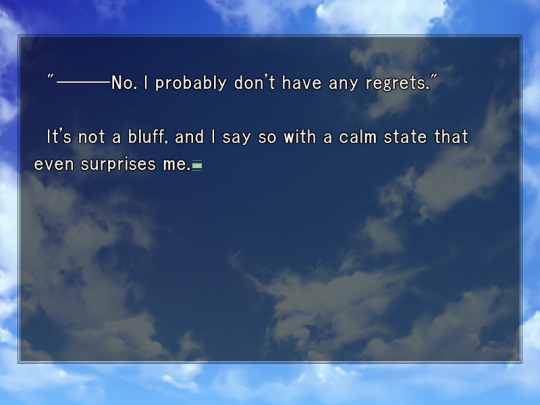
Consider how Illya in the Fate route doesn’t say a single thing about her condition, refuses to burden others with that knowledge, accepting the fact of her death and instead choosing to live in the moment.
Consider how the Unlimited Blade Works route is about Shirou trying to live without regrets, accepting that he will not always succeed, that his self-sacrificing nature will hurt him, but nonetheless his pursuit of that goal is worthwhile.
Consider how Illya’s death is used to illustrate this, how she cannot be saved regardless of whether Shirou makes the choice to intervene or not, how his sorrow is used as proof of his brokenness and his ability to move forward regardless is used as proof of his strength.

Consider why the Heaven's Feel route is named after the ritual that materializes the soul, why this is identified with salvation and rebirth by the Einzberns. I would argue that the Third Magic is a metaphor for the process Shirou undergoes throughout the novel.
He evolves from a machine into a human, gaining his own desires and the will to live. And just as Heaven’s Feel, the ritual, requires a sacrifice: Justeaze’s blood forms the foundation, so too does Heaven’s Feel, the route: Illya spends her own life to fully realize Shirou’s.
In moving past Kiritsugu’s legacy, he moves past his belief that his life is worth less than others. He wants to live, wants to let Illya save him, wants to let her sacrifice herself for him. In moving past Kiritsugu’s legacy, he moves past Illya.
I don’t blame him. I just want to emphasize how significant to this novel the existence of suffering is, how important the figure of someone who cannot be saved, how necessary a single person’s sacrifice. And how this falls on Illya in every route.
In the latter parts of the Fate route she quickly disappears from story relevance. Her functions as a Grail offer a convenient excuse to have her sleeping for much of the day, as it does for Kirei’s kidnapping of her, stringing her up as a sacrifice to open the gate.

In UBW we have Gilgamesh brutally ripping out her heart. He values her purely for her core, which holds the Grail, tossing aside the rest of her body.

If her role as the Grail is what drives her doom, though, she is at least partially able to overcome this at the end of Heaven’s Feel.
For a brief moment, Illya escapes the bonds of fate by uniting her deeply personal wish with the impersonal functions of the Grail.
She also dies. She fucking dies, okay? I’m so tired of talking about this as though it’s supposed to be a good thing, as though we’re just supposed to accept it as the best possible option.
It works precisely because we know there is another, because we know for a fucking fact that an Illya route could have existed, that her salvation is possible not just from a meta perspective but directly implied in-universe.
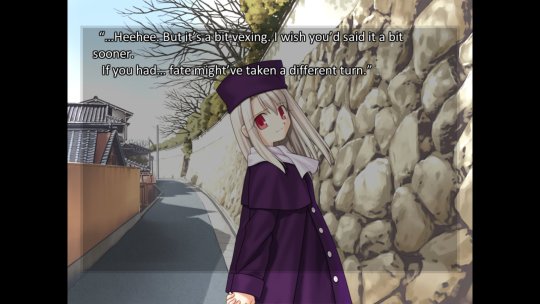
Illya’s power is to grant wishes, but she is incapable of giving voice to her own. She needs someone there by her side to tell her that it’s okay to want to live, and yet- Shirou is so fucking broken that he needs her to do that for him instead.
Illya could have lived, but she doesn’t, and in not doing so she carries half the weight of this story’s tragedy on her back.
In a way this is an excuse for the lack of an Illya route. I really do think its blatant absence adds something to Fate/Stay Night, really sells the tragedy of HF, becomes even more beautiful precisely because of its unattainability.
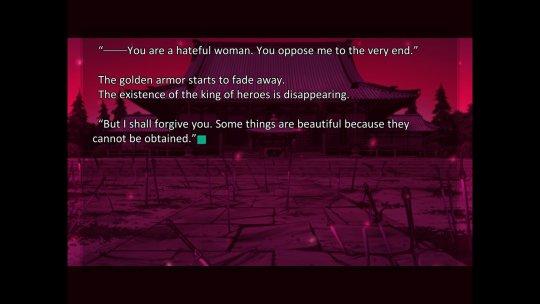
It’s a comment on how the artistic process, materializing your soul on paper if you will, is an inherently restrictive one, rife with failure and things left on the chopping board.
But it does not, not for a second, mean that we should accept the lack of an Illya route. It doesn’t mean the desire for it is a bad thing. It doesn’t mean that its addition would make Fate/Stay Night worse.
It would, however, become a different game at that point, and here I want to pay respect to the one that has lived alongside me for twenty years.
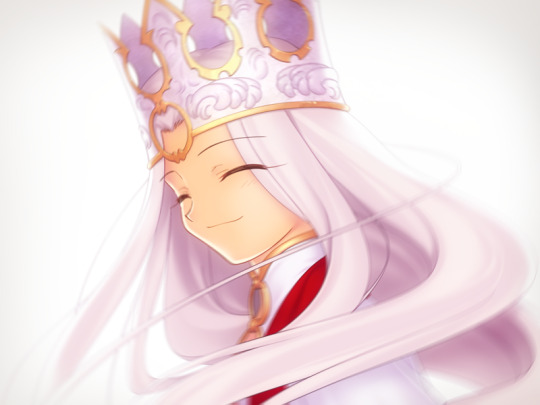
Thanks for reading, and happy anniversary to my favourite story of all time.
247 notes
·
View notes
Text
wyll, in my opinion, gets the standard fare treatment for characters that are unequivocally good. i.e. people think he's boring and uninteresting. standard fare might be kind actually given the level of racism and unexplained slander (which is often just more thinly veiled racism). his reputation about being boring is not helped by the very blatant neglect of his storyline post his rewrite and release. as a wyll enjoyer i am hyperaware of the sorry state of his current story in all three acts
despite all of that and the glaring flaws - i still believe that wylls storyline is worth of being engaged with and explored.
one of the reasons (not the most major one, but one) i think wyll experiences so much neglect as a companion stems from a wider idea that "goodness" is always the uncomplicated, easy choice.
it's something i see a lot. wyll is boring because of his archetype as a princely and universally righteous guy. and this is interesting, because it always seems to functions under the assumption that wylls moral character is innate. that his heroic and righteous actions are in some capacity, uncomplicated.
uniquely among the male origin companions, through the course of wylls story - there is never a point in which he is at risk of making a truly 'bad' choice. both gale and astarions story have them at risk of making choices that are ultimately bad for them and others (especially tav when each character is romanced). gales godhood and astarions ascension are their in game moral failings. they are the result of having not broke the cycle and are 'bad' choices for the individual character.
wylls main choice is however his pact and the choice to break that pact. notably - wyll is never at risk of making a bad choice, only a selfish one.
from the critique i see of wyll - it seems like this is the element of him people find most egregious. he's too smooth, not rugged enough, not gritty enough. but i don't think wyll's character needs grit, necessarily.
if you take any time to dissect wyll at all, based on dialogue and character interaction, many of his choices put himself at the forefront of sacrifice. the game strips wyll of a lot of agency, but wyll also always abides by and sticks to his core belief. so often towards his own detriment.
not only does wyll bear the consequence of being turned into a devil (stripping him of the last remaining shred of identity he's ever had and one of the most important things in his life), he bore the burden of being banished when he made his pact, and was willing to do the same for the sake of his father when he is taken to moonrise.
and unlike gale (who i adore, to be clear) who's concept of self-sacrifice stems mostly from a low self-worth - the belief that dying is the best he can do - wyll truly views that it's better him than them.
wyll does not think twice about allowing himself to be the one to take the fall. he can play any part, take any role, even when these choices haunt him so obviously. wyll claims that he forgives his father, but opens up to you about fearing his feelings of missing him are one-sided. he believes that making his pact was the right choice, the one he would make again - but doesn't deny the obvious pain and solace that came along with being a wandering traveler and banished son.
wylls goodness is so deliberate. he is so staunch in upholding and acting on his beliefs that it is always narrative to his own detriment. when you view wyll like this , and view his choices with regards this character attribute, it is imo very hard to hate him.
wyll's goodness is his double edged sword. it makes him heroic, brave, fearless. and it makes him scared, uncertain and lonely. again, the story itself is bare bones and i understand that - but it is so very beautiful to me thinking of him and tav or just his general romance.
as wylls romance partner, encouraging wyll to break his pact is as tragic as it very beautiful. tav is wylls one selfish thing. one of the only reasons that would move him to not give himself up. one of the only reasons he is okay with forgoing his beliefs. he loves tav enough to break his own oaths, and make choices for himself and no one else. not as the blade, or as a ravengard - but just as wyll.
and that aspect of him is in my opinion, enforced, by the mindflayer tav ending. in which wylls monster-hunting and morals are made exceptions with / for tav. my enjoyment of hero corruption might be speaking for me, but i digress.
in every way though - i truly love wyll as a character. and while im well aware of the critical flaws in his in game story state, i think it's both unfortunate and unfair that people call him boring. to me he is anything but
#aristotle.txt#wyll ravengard#bg3#wyll meta#bg3 wyll#wyll x tav#he is so love of my life coded#this is my experience as a deku defending and lover speaking for me i fear
262 notes
·
View notes
Text
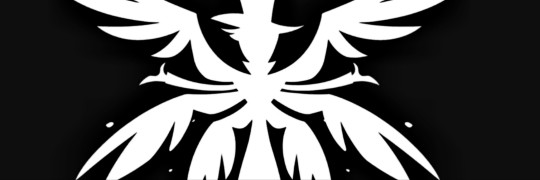
FLY ME TO THE MOON: THE SEVEN VIRTUES OF GOD
Notes: just some information about the seven virtues.
PART ONE | PART TWO | PART THREE
Rankings:
The seven virtues consist of seven angels from different triads.
The archangels are Michael, Gabriel, and Raphael/Reader, the virtues of justice, faith, and kindness.
The only dominion angel is Uriel, the virtue of wisdom.
The only seraphim angel is Jophiel, the virtue of beauty.
The only throne angel is Camuel, the virtue of courage.
The only power angel is Azrael, the angel of death.
Most would think the seraphim angels are the most powerful but it's actually the seven virtues who are the most powerful. Strength and power the seven virtues are better as they are in the front lines.
The seraphim angels listen to them.
The seven virtues stayed most of their time on earth, working their separate duties. They watched over the mortals.
Each virtue watches one continent of earth but they do take turns in each continent.
Each virtue has its own personal mansion in heaven.
Personality Dynamics:
The seven virtues think of each other like siblings or best friends at most.
Michael, obviously the older and the leader. Cares for the other six like an older brother does. Cold, serious and takes his role very seriously.
Gabriel, the second oldest. She's like a big sister. Quite a tease too.
Raphael, the third oldest. An introvert, doesn't know how to show affections. She used to but she's currently suffering depression and therefore has trouble understanding her emotions lately but she cares. Very cold and serious when in work mode but awkward and chill during their day off.
Uriel, the same age as Raphael. Very smart, often speaks like a poet or a crackhead and there's no in-between. Total sweetheart and always ready to help. Serious when doing his job.
Jophiel, the same age as Raphael. A flirt, likes teasing others and especially the other virtues. Hides away from responsibilities if he has the chance. If he can't then he would take his job very seriously.
Camuel, the same age as Raphael. Despite being the virtue of courage, he gets scared very easily. Strong though, so he can fight. Got along with the other virtues.
Azrael, the same age as Raphael. A very playful, mischievous, flirty, serious angel. He tends to make fun of others but knows when not to cross the lines. A little sadistic. Always have a smirk on his face, very condescending when in work mode.
The seven virtues both have work and relax mode. When working they are downright terrifyingly serious. But when they don't have any work then they are quite chill.
Michael barely gets any sleep. Functions with coffee 24/7.
Raphael barely has any motivation to do anything.
All seven virtues have sass in their tongues.
Uriel does dad jokes or corny jokes.
Jophiel the victim to listen to those jokes.
All seven of them are tired as fuck, very overworked lmao.
Michael and Azrael often argue cuz the reaper teases Michael. Tend to end up in a fight.
Gabriel tries to break it off and accidentally gets included in the fight.
Camuel the one who actually breaks it off.
Raphael is just there, already used to it.
Jophiel and Uriel watching the fight while eating popcorn, making bets.
Work:
Michael watches over the fairness and equality of earth. Keeping track of mortals' deeds.
Gabriel watches over the faiths of humans, offering guidance to mortals. She's the one who sends mortals' prayers to god.
Raphael watches over the sick and healthy. Providing health to the people who needed it.
Uriel watches over the people and keeps track of the progress made by humans.
Jophiel watches over nature and the non humans, making sure equality is present in all of god's creation.
Camuel watches over the people, providing protection.
Azrael the reaper of souls, guides souls to their destination in the afterlife. Updates the book of life that St. Peter uses so he'll know if there's a new soul that would arrive in heaven.
Day Off Dynamics:
Stays in heaven to recharge.
Often have sleepovers.
Gets very chaotic as they often have nights where they go out for drinks.
Game nights are nights of betrayal.
Michael sucks at uno.
Azrael kept on winning.
Loser does the winner's paperworks.
Gossips. Lots of gossips.
Whether it's heavenly tea or mortal ones.
Michael to Azrael during uno: “Right hand on the bible, god can strike me down if I'm lying. The mf is cheating!”
Yes, they swear.
Only when it's just the seven of them in the room.
Probably hibernates for two whole days.
Other fun facts:
Azrael has two floating or flying eye pets, he can use it to eavesdrop in heaven when he's on earth. It serves as his second pair of eyes. He's always watching.
Michael wields a sword.
Gabriel uses a book as she's more of a mage type of angel.
Raphael uses a sword.
Uriel uses a sword.
Jophiel uses a book to conjure spells.
Camuel uses a bow and arrow.
Azrael uses a staff that transforms into a scythe.
Jophiel accidentally turned himself a frog once and had to attend a virtues meeting in frog form. The others never let him forget.
Uriel drinks more wine than water.
The only girls in the seven virtues are Gabriel and Raphael.
[Y/n] is often rolled into a burrito by the others if she's depressed.

306 notes
·
View notes